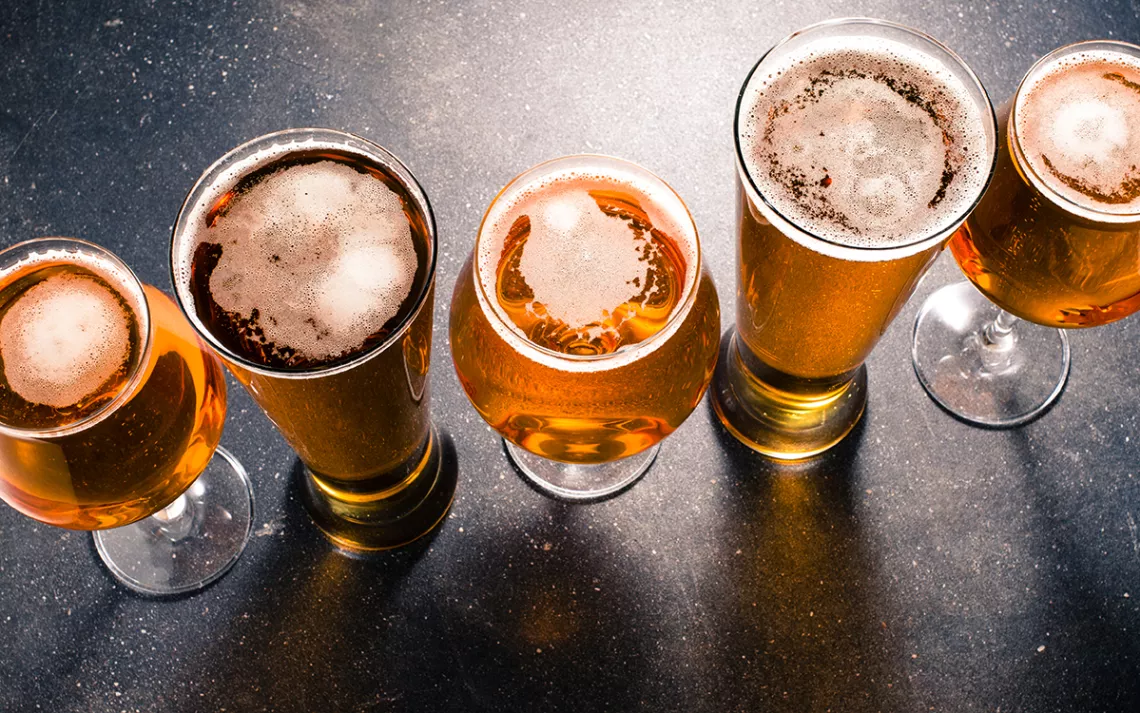Happy Hour Threatened When Needed the Most
Study shows that rising beer prices will add insult to climate change injury

Photo by LeszekCzerwonka/iStock
A cold one at the end of the day could become scarcer on a warming planet. A report published earlier this fall in Nature Plants suggests that beer—the most popular alcoholic beverage in the world—could see higher prices and lower consumption by the end of the century because of climate change.
“Although it may be argued that consuming less beer is not disastrous—and may even have health benefits,” the study says, “there is little doubt that for millions of people around the world, the climate impacts on beer consumption will add insult to injury.”
The international team of researchers focused on barley, one of four main ingredients in beer beside water, yeast, and hops. Roughly a fifth of the world’s barley goes to the beer industry, but yields of this cereal grain “decline sharply in periods of extreme drought and heat.” The study figures that as droughts and heat events intensify throughout the coming century, a decrease in barley yields will hurt a “luxury good” like beer as “adaptation efforts prioritize necessities.” In other words, less barley will go to beer as we devote surviving yields to food or livestock feed.
The researchers used a combination of climate and economic models to project how barley will cope in the coming century. Not well, they conclude, if emissions continue at the present rate. Their climate scenarios showed a global average yield loss anywhere from 3 to 17 percent. As a result, the price of beer will rise, particularly in countries where it’s in high demand. For instance, the beer-loving Irish may expect to pay triple the price for a pint in the worst-case scenario.
These findings didn’t sit well with some in the barley and beer industries. Bart Watson and Chris Swersey of the Brewers Association based in Boulder called the study a mere “academic exercise and not one that brewers or beer lovers should lose any sleep over.” In a blog post, they point out that U.S. barley yields have actually increased over the last 80 years, and will continue to do so. The report itself admits that barley yields will fare better in North America in a changing climate, “but not enough to offset the global decrease.”
Watson and Swersey also mention that the study fails to figure how the farmers and brewers will adapt and innovate throughout the rest of the century. Dwight Little, president of the Idaho Grain Producers Association in the country’s top barley-producing state, has a similar faith in the agricultural sector. "If warming happens as they say it will,” he told NPR, “my impression is that it will come in small, incremental increases over a long time, and that allows farmers time to change."
Either way, the researchers themselves acknowledge that the future of beer is the least of our concerns. Steven Davis, a UC Irvine earth systems scientist and coauthor of the study, tweeted that he was “not sure what to make of the fact that in one day our paper on climate and beer has garnered considerably more attention than any of my previous work on energy transitions or even air-pollution deaths.”
A potential threat to the global beer supply represents just one symptom of a much-larger problem. Earlier this fall, the Intergovernmental Panel on Climate Change released its newest report, saying that we have even less time than previously thought to offset impending effects of climate change. Last week’s National Climate Assessment presented a similar outlook.
And just a few days ago, on the eve of the United Nations Framework Convention on Climate Change in Poland, a coalition of 130 national academies of science and medicine across the world published a paper urging world leaders to reexamine our global agricultural system. “Our food systems are failing us,” said Joachim von Braun, an economist and co-chair of this research.
A threat to the global beer supply is wrapped up in a much larger issue. In addition to focusing on the effects of climate change on public health and the fate of our food systems, the study suggests ways that unchecked greenhouse gas emissions may also infringe on our cultures and customs.
After all, beer brings people together—as it has for much of recorded history. “Eating and drinking, and even more particularly, the consumption of alcohol, are usually very strongly embedded in socio-cultural ideologies,” writes historian Max Nelson in his book The Barbarian’s Beverage. “They tend in most societies not to be solitary activities but social ones.”
“There is something fundamental in the cross-cultural appreciation of beer,” University of East Anglia economist and study coauthor Dabo Guan told The Guardian. “If you want to still have a couple of pints of beer while you watch football, then climate change [action] is the only way out. This is the key message.”
 The Magazine of The Sierra Club
The Magazine of The Sierra Club



